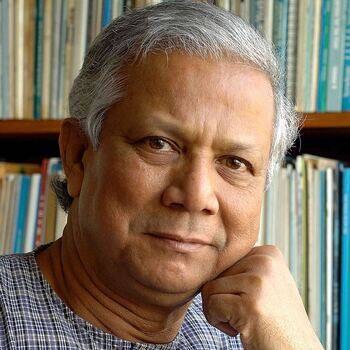SUMMARY
Early life:
Yunus was born on 28 June
1940 to a Muslim family in Hathazarai, Chittagong. In 1940, that was part of
British-controlled India. But, after independence in 1947, became East
Pakistan. (and later Bangladesh)
Yunus was an excellent
student, becoming one of the best students in the year at Chittagong Collegiate
School, and later Chittagong College. He completed a BA degree in economics at
Dhaka University in 1960, and his MA in 1961.
After
graduation, he taught
economics at Chittagong College and served as a research assistant under
Nurul
Islam. In 1965 he gained a Fulbright scholarship to study in the UN.
Later in
1971, he gained a PhD in economics from the Vanderbilt University
Graduate Program in Economic Development. He also worked as an assistant professor of
economics at Middle Tennessee State University.
In 1970, he met Vera
Forostenko a Russian immigrant to the US. They had one child, Monica Yunus, but
Vera did not want to live in Bangladesh and the couple split. Yunus later
married Afrozi Yunus, and they had one daughter Deena Afroz Yunus.
Muhammad Yunus is a Bangladeshi banker and
recipient of the Nobel Peace Prize (2006). Yunus is credited with developing
the concepts of microfinance and microcredit. These are schemes which offer
small loans to the rural poor – to enable them to invest and lift themselves
out of poverty.
“When we want to help the poor, we usually
offer them charity. Most often we use charity to avoid recognizing the problem
and finding the solution for it. Charity becomes a way to shrug off our
responsibility. But charity is no solution to poverty.
Yunus decided to lend some
of his own money to 42 women in the village of Jobra, near Chittagong. It was
only a total of US$27, and he was repaid with a profit of $0.02 on each loan.
This convinced him microloans were a viable business model.
Video
Lecture Links:

Comments
Post a Comment